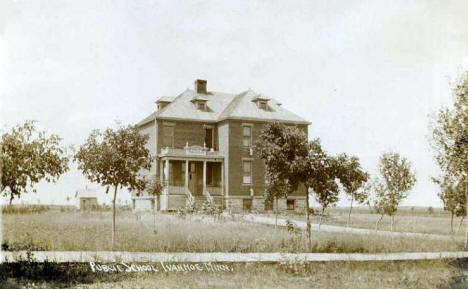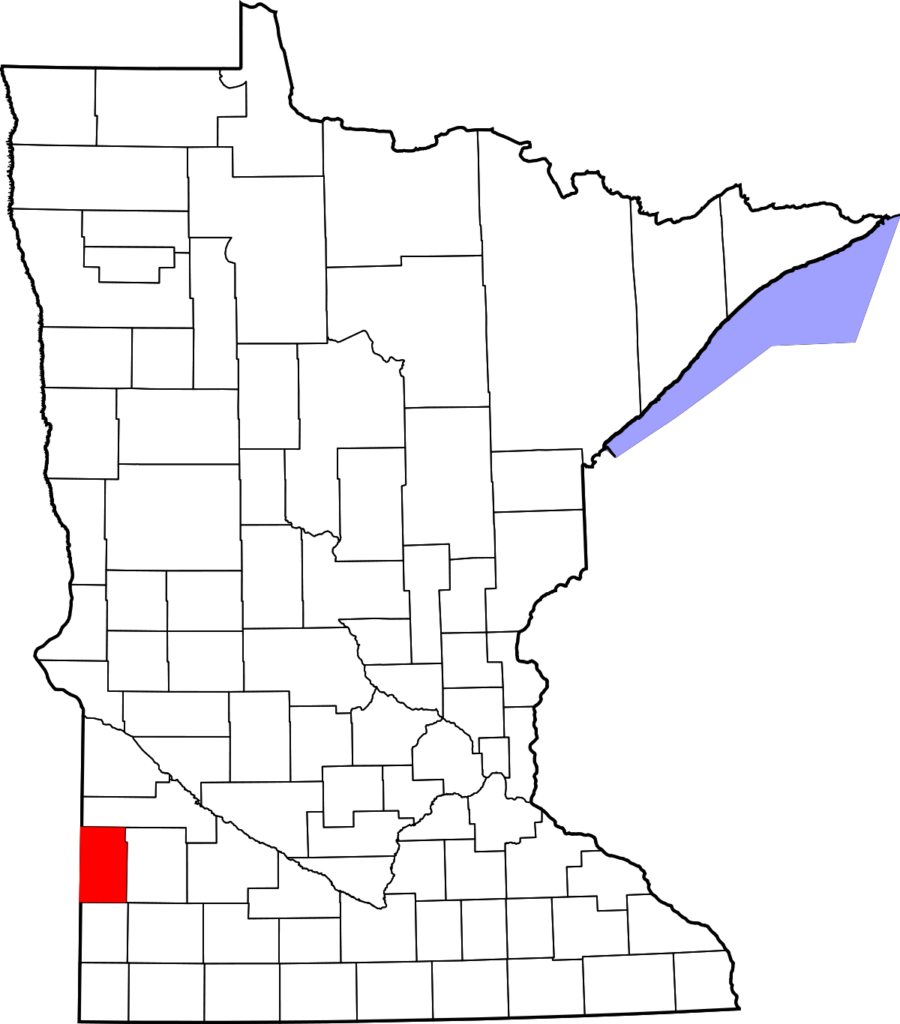Lincoln County

Ivanhoe Public School, 1910 – Courtesy of LakesnWoods.com

Locations in Lincoln County where Poles settled include:
Towns: Ivanhoe
Unincorporated Communities: Wilno
Townships: Royal Township
Few Poles came to this area came directly from Poland. Many moved to Lincoln County as secondary immigrants, coming from Michigan, Chicago, LaSalle (Illinois) and Pennsylvania. Some also came from Polish settlements in Nebraska. Most came between 1871-1885. The median year of immigration was 1879. Many were originally from the Poznan area, but there were also a few who emigrated from Pomerania and Galicia. The population of Wilno in the early years had a high percent of Polish residents:
- In 1885, 55% were Polish
- In 1895, 68% were Polish
- In 1900, 72% were Polish
Many families remained in the Wilno/Ivanhoe area for generations. Some moved on to South Dakota, some back to Michigan.
County-Wide Resources
Catholic Churches and Cemeteries
The church was a central point in the lives of Polish immigrants. Learn more about the churches and cemeteries in Lincoln County where Polish families worshiped.

Vital Records and Land Records
The Lincoln County Recorder’s Office maintains birth, marriage, death (dating back to 1879) and land records (dating back to 1874).
Historical Society and Museum
The Historical Society and Pioneer Museum preserve artifacts and historical information related to Lincoln County and its people.
U.S. Bureau of Land Management
The U.S. Department of Interior’s Bureau of Land Management has General Land Office Records where you can pick the state and county, then type a surname. If an ancestor purchased land, you will likely be able to see the document and details about the land and purchase.
Census Records
United States Census Records
You can find a lot of information about the U.S. Census records on the National Archives website. The U.S. Census was done every ten years from 1790 through 1950. (the site has direct links to census records for 1940 and 1950). FamilySearch and Ancestry also have census records (Ancestry requires a paid subscription).
Minnesota State Census Records
- The first Minnesota Territorial Census was taken in 1849, and was taken again in 1850, 1853, 1855, and 1857.
- After Minnesota became a State in 1858, the Minnesota State Census was taken every 10 years, in years that ended with a 5: 1865, 1875, 1885, 1895, and 1905.
- 1905 was the last year of the Minnesota State Census.
General Genealogy Links
The following are websites with general resources and genealogy information about Lincoln County:
PGS-MN Newsletter Articles
(You will need to scroll down to the page indicated to find the article within the newsletter link)
| Newsletter | page | Title/Author |
|---|---|---|
| Fall 2009 | 7 | A Polish Community Goes to War: A Review of the Turbulent Events of 1939-1946 by John Kowles |
| Winter 2009 | 1 | Drobne Echa Article: Installment #18- Wilno, Minnesota From Wiarus, 1886 – 1887 by Greg Kishel |
| Summer 2010 | 1 | Drobne Echa Article: Installment #20 – Wilno, Minnesota From Wiarus and Katolik, 1886 – 1894 by Greg Kishel |
| Winter 2022 | 10 | How I Found My Korcal Family’s Village of Zblewo by Kay Freund |
| Spring 2023 | 7 | Continuing My Search for My Korcal Ancestors by Kay Freund |
Other Articles
(Note: * The three starred articles can be accessed by setting up a free account with JSTOR – just click on “Register” when you open the link. You can read up to 6 articles/month without charge.
The Polish American Studies journals are also available at the Hoffman Research Library at the MN Genealogy Center.
| Title | author/publisher | comments |
|---|---|---|
| Out on the Wind: Life in Minnesota’s Polish Farming Community | by John Radziłowski Minnesota History Magazine, volume 58, no.1, pages 16-28, 2002 | PDF of the article |
| One Community, One Church, Two Towns: The Poles of Southwest Minnesota, 1882-1905 | by John Radzilowski Polish American Studies, Volume 48, No. 2 , Autumn 1991, pp. 5-25 | * Note: You can read this article online here – set up a free account by clicking “Register” and read up to 100 articles/month. The Polish American Studies journal can be also be found at the Hoffman Research Library at the Minnesota Genealogy Center. |
| Family Labor and Immigrant Success in a Polish American Rural Community, 1883-1905 | by John Radzilowski Polish American Studies, Volume 51, No.2, Autumn 1994, pp. 49-66 (this article is focused on Wilno) | * Note: You can read this article online here – set up a free account by clicking “Register” and read up to 100 articles/month. The Polish American Studies journal can be also be found at the Hoffman Research Library at the Minnesota Genealogy Center. |
| A New Poland in the Old Northwest: Polish Farming Communities on the Northern Great Plains | by John Radzilowski Polish American Studies, Volume 59, No.2, Autumn, 2002, pp.79-96. | * Note: You can read this article online here– set up a free account by clicking “Register” and read up to 100 articles/month. The Polish American Studies journal can be also be found at the Hoffman Research Library at the Minnesota Genealogy Center. |
| Born a Gypsy: Secondary Migration and Spatial Change in Two Polish Immigrant Communities, 1880-1925 | by John Radzilowski Polish American Studies, Volume 66, No. 2 (Autumn 2009), pages 73-85 University of Illinois Press | * Note: You can read this article online here – set up a free account by clicking “Register” and read up to 100 articles/month. The Polish American Studies journal can be also be found at the Hoffman Research Library at the Minnesota Genealogy Center. |
Book
| TItle | author/publisher | comments |
|---|---|---|
| Out on the Wind: Poles and Danes in Lincoln County, Minnesota 1880-1905 | by John Radzilowski Crossings Press, 1995 | This book can be found in the Hoffman Research Library at the Minnesota Genealogy Center. |
Maps
Plat maps are helpful in showing who owned the land that year. Click on the area you are interested in until you get to the detail level with names.
Wilno
Due to its distance from larger cities and the river, Wilno was one of the last areas of the state to be settled. Bishop John Ireland turned to the Poles to move there, promoting the advantages of farm life. Crops of wheat, oats and peas were productive in the Wilno area due to fertile, black soil that held moisture.
General Genealogy Links
The following are websites with general resources and genealogy information about Wilno:
Ivanhoe
General Genealogy Links
The following are websites with general resources and genealogy information about
Public Library
Public libraries have valuable resources related to genealogy and local history.
Historic Newspaper
The Ivanhoe Times Newspaper began printing weekly in 1900 and is still being published. Issues can be viewed at the Gale Library at the Minnesota Historical Society in St. Paul, MN.